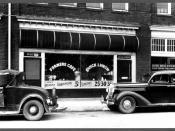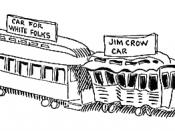The topic of race has always been a heated issue among the 'worlds' conversation.' The South exemplifies this 'world,' the Changing South. In the South, race played a role that was not encountered anywhere else in the United States, maybe even the world. Fannie Flag's book, Fried Green Tomatoes at the Whistle Stop Cafe displays the lasting effect of race relations in a richly comic, poignant narrative. Throughout the story, race is brought up, as Flagg teaches us, the reader, to respect each other for who we are, not what we are.
Flagg's book clearly demonstrates how race permeated daily life in the Deep South in the years prior to World War II. While reading Fried Green Tomatoes, it becomes evident that blacks are not treated well, and whites are considered to be the higher class of people. Blacks did not gain any respect, especially considering the remedial jobs that they received.
The Threadgoode family did give the blacks jobs, unfortunately, these jobs were only manual labor types. Interrelation associations did not exist too frequently in the small town of Whistle Stop, Alabama. George, the Threadgoode servant, never dared to give his opinion, or complain about the work that the Threadgoode family asked that he perform. George, compared with the other blacks during this time, was treated very well by the Treadgoode family, and that is why he never deceived anyone in the tiny town. Law did not permit Afro-Americans to eat in the cafe, nor were they permitted to interact freely with the majority white population. It was not an uncommon occurrence during the 1930s for the Klu Klux Klan (KKK) to harass and beat blacks that they felt were being a 'thorn in their sides.' Whites were looked down upon by the KKK and other white separatist...



Fried Green Tomatoes
Good Writing Style
Might wish to improve a little on the communiction
80%
3 out of 4 people found this comment useful.